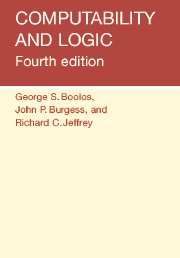
-
Select format
-
- Publisher:
- Cambridge University Press
- Publication date:
- 05 June 2012
- 04 March 2002
- ISBN:
- 9781139164931
- Dimensions:
- Weight & Pages:
- Dimensions:
- Weight & Pages:
- Subjects:
- Computer Science, Logic, Philosophy, Computing: General Interest
You may already have access via personal or institutional login- Subjects:
- Computer Science, Logic, Philosophy, Computing: General Interest
Book description
This fourth edition of one of the classic logic textbooks has been thoroughly revised by John Burgess. The aim is to increase the pedagogical value of the book for the core market of students of philosophy and for students of mathematics and computer science as well. This book has become a classic because of its accessibility to students without a mathematical background, and because it covers not simply the staple topics of an intermediate logic course such as Godel's Incompleteness Theorems, but also a large number of optional topics from Turing's theory of computability to Ramsey's theorem. John Burgess has now enhanced the book by adding a selection of problems at the end of each chapter, and by reorganising and rewriting chapters to make them more independent of each other and thus to increase the range of options available to instructors as to what to cover and what to defer.
Reviews
‘… gives an excellent coverage of the fundamental theoretical results about logic involving computability, undecidability, axiomatization, definability, incompleteness, etc.’
Source: American Math Monthly
‘The writing style is excellent: although many explanations are formal, they are perfectly clear. Modern, elegant proofs help the reader understand the classic theorems and keep the book to a reasonable length.’
Source: Computing Reviews
‘… a valuable asset to those who want to enhance their knowledge and strengthen their ideas in the areas of artificial intelligence, philosophy, theory of computing, discrete structures, mathematical logic. It is also useful to teachers for improving their teaching style in these subjects.’
Source: Computer Engineering
Contents
Metrics
Altmetric attention score
Full text views
Full text views help Loading metrics...
Loading metrics...
* Views captured on Cambridge Core between #date#. This data will be updated every 24 hours.
Usage data cannot currently be displayed.
Accessibility standard: Unknown
Why this information is here
This section outlines the accessibility features of this content - including support for screen readers, full keyboard navigation and high-contrast display options. This may not be relevant for you.
Accessibility Information
Accessibility compliance for the PDF of this book is currently unknown and may be updated in the future.


